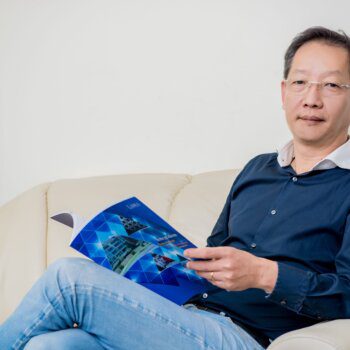(Women on Top in Tech is a series about Women Founders, CEOs, and Leaders in technology. It aims to amplify and bring to the fore diversity in leadership in technology.)
Here is our interview with Laina Raveendran Greene, Founder of GETIT Inc. and Co-Founder of Angels of Impact, an impact network focused on women social entrepreneurs helping to alleviate poverty. She is an entrepreneur and social impact investor, whose passion is female empowerment, and enabling women to be key agents to help alleviate poverty in Asia.
What makes you do what you do?
As a minority female Singaporean from relatively humble beginnings, I have never taken anything for granted. I learnt early on that I have to work doubly hard to overcome the “glass ceilings” but if I persevere, I can succeed. That is why I chose to focus on helping women-led social enterprises as I know how hard things are for them and I hope to make things a little easier for them.
How did you rise in the industry you are in?
I rose by being courageous enough to push against the “glass ceiling” and seizing opportunities open to me no matter where they were. Early on, I realized I would have better opportunities overseas, so I worked in many countries, including Switzerland, USA, and Indonesia and used these opportunities to learn and open new avenues for myself. I now come back to Singapore with many more networks and skill sets.
Why did you take on this role/start this startup especially since this is perhaps a stretch or challenge for you (or viewed as one since you are not the usual leadership demographics)?
Yes, as a minority Singaporean, it may appear that I am not the usual leadership demography in Singapore. In my own way, however, I think I have amassed my own international accolades and work experience such as serving as the first Secretary General for the Asia Pacific Internet Association, CEO of one of the first few tech startups in Singapore in the early 90s, being on the International Steering Committee of the Global Telecommunication Women Network, and most recently selected as one of the 2nd cohort of Edmond Hillary Fellows in New Zealand.
I am now moving to the next phase of using these networks and skills to help other women to social enterprises, which seem to be exactly what I want to do in my next phase of life (after more than 25 years of global work experience).
Do you have a mentor that you look up to in your industries or did you look for one or how did that work?
It was harder in my younger days, as one of the few women in tech to find mentors but today I do. Men were reluctant to mentor me for fear of rumors.
How did you make a match if you did, and how did you end up being mentored by him?
I found my mentor when I was taking an executive program at Stanford. He was one of the keynote speakers and I went to talk to him. Intrigued by my background, when I asked if he would mentor me, he said yes. I meet with him at regular intervals and I always ensure I have put his ideas to test before reporting back to him. I feel that I value his time if I do actually listen and act on his advice.
Now as a leader how do you spot, develop, keep, grow and support your talent?
The key qualities I look for is an eagerness to learn and humility to be open to new ideas. Also, when asked to be a mentor, I usually give homework and see how proactive they are. Only the ones who do their homework, take the advice and act on it, are the ones I actively mentor.
Do you consciously or unconsciously support diversity and why?
I consciously and unconsciously support diversity, as I see the importance of diversity on true innovation. You never get anything new, talking to like-minded people. It is always good to have different perspectives to create new ideas. I am also an active supporter having faced racial and gender discrimination in my life and want to ensure that others are given a better chance.
What is your take on what it takes to be a great leader in your industry and as a general rule of thumb?
A great leader to me is one who has empathy and humility, and a genuine spirit of service. Today’s challenges such as climate change and social injustice, requires many players to apply their knowledge and skills to solve and have a sense of ownership in solving these issues
Advice for others?
The only advice I can think of is do what you are strongly passionate about. You need to persevere to succeed so it helps if you truly care about the endeavor you are working on.
If you’d like to get in touch with Laina Raveendran Greene, please feel free to reach out to her on LinkedIn: https://www.linkedin.com/in/laina/





























